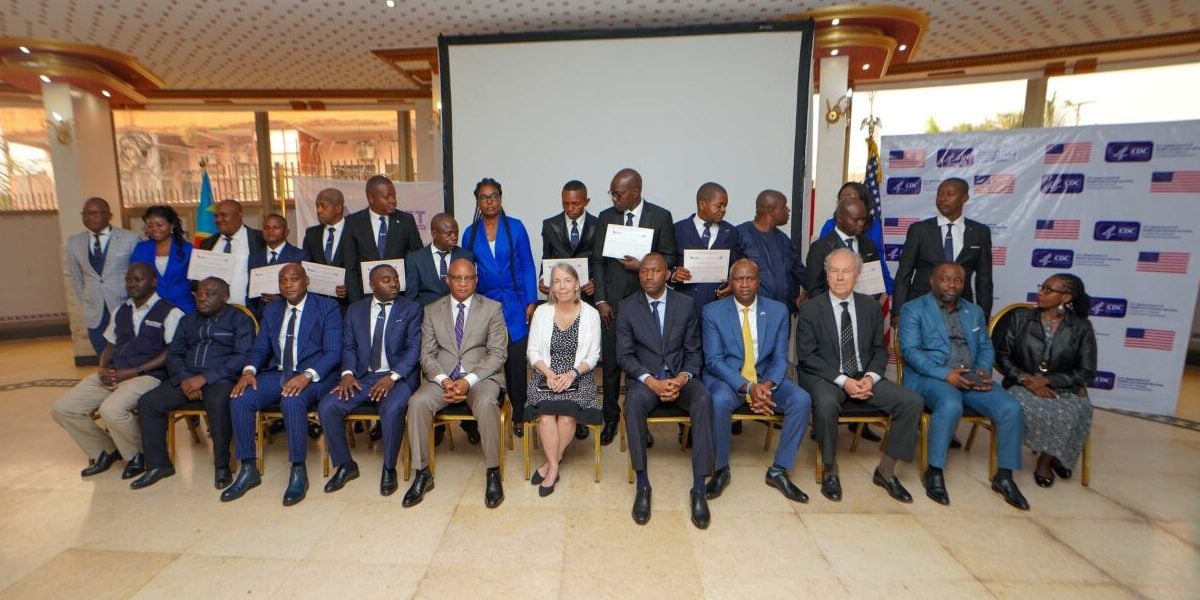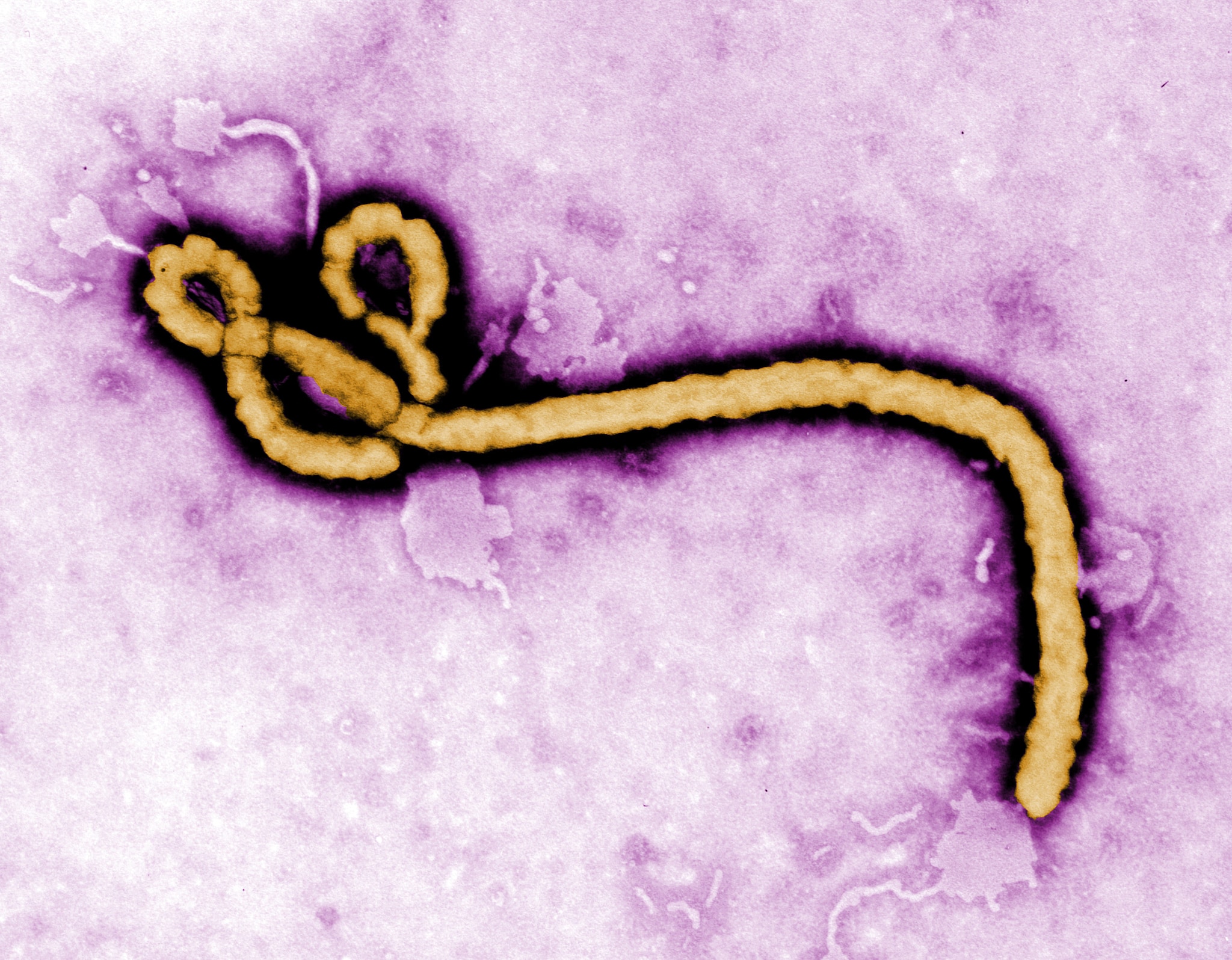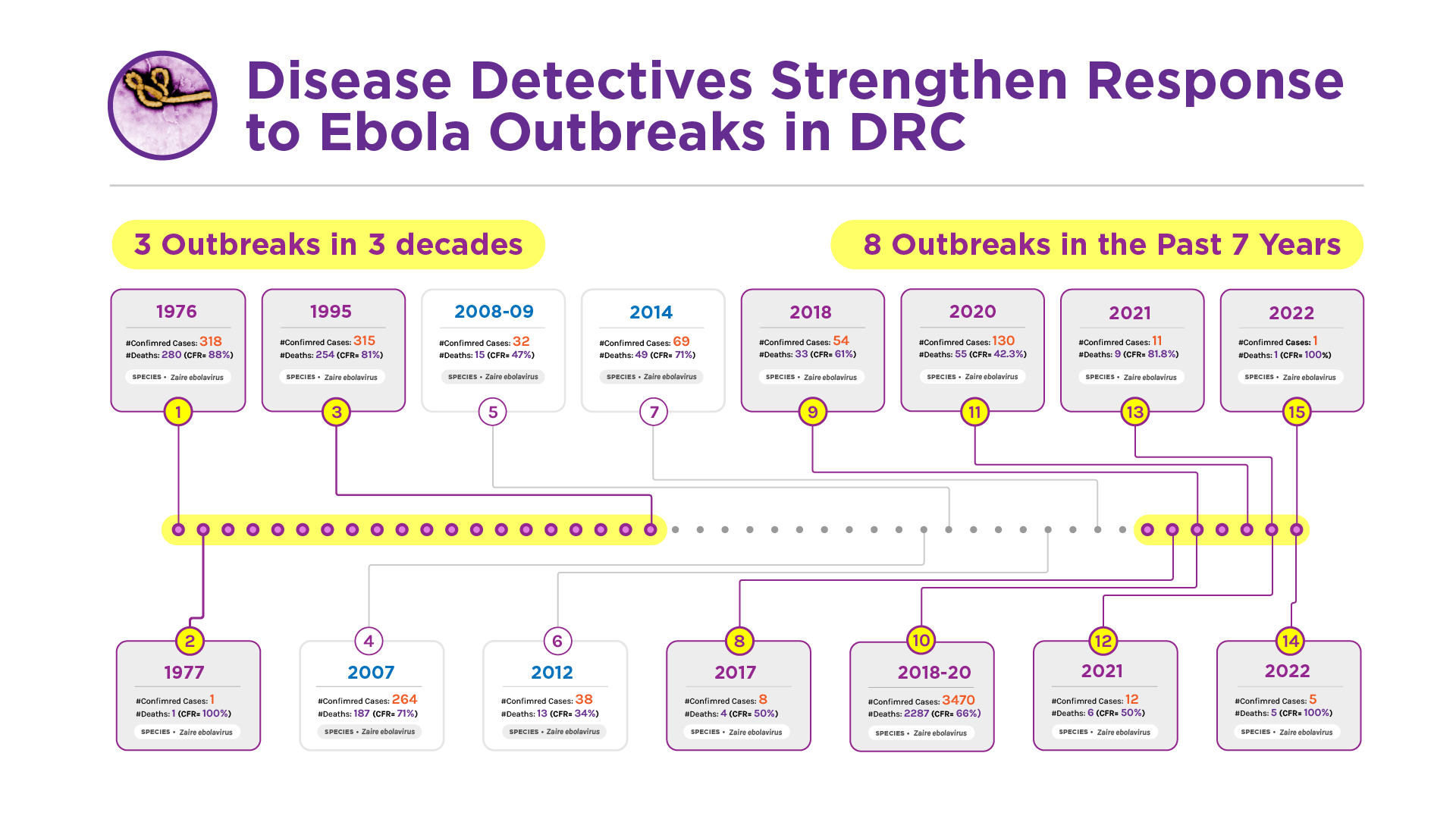CDC Trains Field Epidemiologists Who Respond to Disease Outbreaks in the Democratic Republic of the Congo
August 31, 2023

CDC-supported inaugural FETP Intermediate Level graduation ceremony August 11, 2023. Ten residents from different provinces in DRC graduated in the inaugural class. The ceremony was presided over by US Ambassador to the DRC, Ambassador Lucy Tamlyn and the Director General of the National Public Health Institute, Dr Dieudonne Mwamba. Photo: US Embassy Kinshasa
The Democratic Republic of the Congo (DRC) is the second largest country in Africa and has an estimated population of 100 million inhabitants. The country experiences frequent disease outbreaks, and ongoing conflict has hindered economic development. The health system is also confronted with many challenges that limit the country’s ability to respond to disease outbreaks.
Since 1976, when the first Ebola Virus Disease (EVD) outbreak occurred in the northwest of the country near the Ebola River, DRC has experienced 15 EVD outbreaks, with the most recent declared on August 21, 2022. As a result of these outbreaks, DRC has gained extensive experience in responding to multiple Ebola outbreaks including the largest outbreak which occurred between 2018-2020 and registered over 3,400 cases and more than 2,200 deaths. Also, between 1998-2000, there was a large outbreak of Marburg virus disease in Watsa health zone, northeastern DRC, with 154 cases and 128 deaths.
Challenges to Mounting Rapid Response Activities
Due to long distances, lack of transportation infrastructure, and insecurity, the timely detection of outbreaks with rapid laboratory confirmation and prompt responses has been difficult to organize. It can take several months to confirm outbreaks of disease due to difficulties transporting specimens to the national laboratory from remote areas. These types of challenges allow for outbreaks to expand before any appropriate response activities can be organized. Nevertheless, progress has been made in reducing the time from when an outbreak occurs to receiving laboratory confirmation of the event. For example, while the 2018-2020 EVD outbreak took nearly two months to confirm, the most recent 2022 outbreak was confirmed in under a week.
This exemplifies the DRC government and the Ministry of Health’s (MoH) commitment to improve response capacity to events of public health importance. These efforts have focused on improving health worker capabilities, creating an incident management system, and reinforcing laboratory technical capacity. The improved capacities protect not only DRC by rapidly controlling outbreaks, but also prevent national, regional, and global spread consistent with the requirements under the International Health Regulations (IHR).
Progress in EVD control in DRC can be attributed to the MoH’s leadership and collaborative efforts with the U.S. CDC and other partners in establishing and implementing a multitude of health system-strengthening initiatives including the Field Epidemiology Training Program (FETP).
Increasing Workforce Capacity through FETP
DRC’s FETP was established in 2013 with the support of CDC, the DRC MoH, the African Field Epidemiology Network (AFENET), and the University of Kinshasa School of Public Health (KSPH). Since its inception, FETP has trained staff that are now present at different levels of the health system. Their positions play a pivotal role in DRC’s improved ability to effectively manage and counteract disease outbreaks preventing them from escalating into large-scale public health emergencies.
Since 2015, more than 430 trainees have successfully completed DRC’s FETP. DRC’s FETP is comprised of three distinct levels: the advanced course lasting 2 years; the Intermediate level lasting 9 months; and the Front-Line level of 3 months. Each level is targeted to train workers in increasingly sophisticated methods in field epidemiology that give the trainees the skills and tools needed to enhance the country’s outbreak investigation and response capabilities.
The FETP Intermediate is the newest level of FETP training in DRC and graduated its first cohort of 10 trainees from 5 different provinces in August 2023. FETP graduates are increasing the backbone of public health professionals found throughout the country. FETP graduates directly support critical work in detecting, confirming, and responding to all types of infectious disease outbreaks including EVD, COVID-19, measles, cholera, mpox, polio, and typhoid. The expertise FETP graduates bring is critical to safeguard public health during these public health emergencies.
Professor Dieudonné Mumba Ngoyi, Deputy Director of the Institut National de Recherche Biomédicale (INRB) and Head of the Department of Parasitology noted: “FETP is a program initiated and funded by CDC, in collaboration with the Ministry of Health and the Kinshasa School of Public Health. The experts graduating from this training are the pride of the country because they are out in front of outbreak response and disease control in DR Congo and across Africa.”
Improving Systems and Ebola Response Preparedness
Historically, staff from international organizations have been heavily involved in the response to EVD outbreaks conducting case investigations, contact tracing, surveillance, and health communication. Currently, this model of outbreak response is experiencing signs of change. For the recent 2022 EVD outbreaks, the response was managed entirely by national, provincial and district level staff, many of whom are FETP-trained. DRC has also scaled up training of rapid response teams and public health emergency management with CDC support. The public health workforce is increasingly capable of responding to EVD outbreaks with less partner support. CDC has played a significant role in these improvements through its support to the DRC MoH. The national MoH and even provincial health offices now routinely designate Incident Managers to coordinate outbreak response activities consistent with principles of public health emergency management recommended by CDC. This was most clear in the August 2022 EVD outbreak and more recent investigations of clusters of suspected EVD cases. During these events in-country personnel successfully led both management and on-the-ground response, rapidly investigating the situation to implement control measures.

View of Ebola Virus under a microscope
Strengthening Laboratory Diagnostic Capacity
CDC’s engagement in strengthening laboratory diagnostic capacity in DRC has been significant and aligns with the vision and goals of the national laboratory strategic plan that CDC supported. Activities have included decentralizing laboratories and increasing the number of diseases that laboratories can confirm, improving specimen collection and handling to ensure they are correctly processed to maximize accurate test results, optimizing lab networking for specimen referrals, installing laboratory information systems for streamlining laboratory processes, and return of results, and improving proficiency and quality management. CDC has also established mobile sequencing laboratories that were indispensable during EVD outbreaks in Equateur and North Kivu provinces. These labs allowed rapid confirmation and genetic sequencing of the virus to map human transmission chains and then intervene to disrupt them. Such precision is a cornerstone of comprehensive outbreak investigations that inform the implementation of response strategies.
CDC has also been a pioneering partner in developing the pathogen genomic sequencing laboratory at the INRB, the national reference and diagnostic laboratory in the country. This support includes the provision of reagents, essential lab supplies, trainings, and the transfer of advanced technology developed by CDC laboratory scientists. In late 2022, when an EVD outbreak emerged in Uganda, CDC quickly transferred laboratory capacity for testing a different Ebola viral strain (Ebola Sudan). CDC provided INRB with reagents to test for the specific Ebola Sudan that was responsible for the outbreak in Uganda at the end of 2022. CDC also supported the successful evaluation and use of Ebola rapid diagnostic tests (RDTs) for enhanced post-mortem surveillance. DRC FETP residents helped to pilot RDTs effectively in post-mortem (autopsy) surveillance. This is important as many EVD and Marburg virus disease outbreaks are associated with unsafe traditional burial practices. Use of RDTs for post-mortem testing has led to implementation of EVD testing for any death that is suggestive of possible EVD. DRC is now expanding serological surveys for Ebola to better understand the true number of infected individuals. Additionally, there is an ongoing program for Ebola survivors to study how the virus persists in the human body and what factors determine “flare-ups” and transmission in addition to the classic zoonotic transmission.
CDC’s provision of laboratory diagnostic reagents for first-line diagnosis of suspect Ebola Zaire (and mpox) are critical contributions in support of rapid disease confirmation. In many instances, FETP-trained health workers are the ones collecting the specimens and getting them tested quickly. This coordination contributes directly to the rapid detection of suspect cases of disease, quick laboratory confirmation, and then immediate implementation of response and control measures to minimize adverse impacts on the population.

History of Ebola Outbreaks in DRC - For a 508 compliant version of this image Click Here
Moving Forward
CDC’s investments towards FETP, laboratory capacity, and public health emergency management have improved DRC’s public health capacity to respond to Ebola outbreaks. It is critical to maintain CDC’s engagement in a key country for the African continent. Maintaining CDC’s role in support of training, capacity and skill development among public health leaders builds systems and relationships that are needed for effective coordination among US and international agencies to advance Global Health Security objectives. Although the work is not yet done, DRC demonstrates how progress can be achieved by strong collaborative partnerships with national authorities that serve the interest and well-being of citizens in both countries and globally.